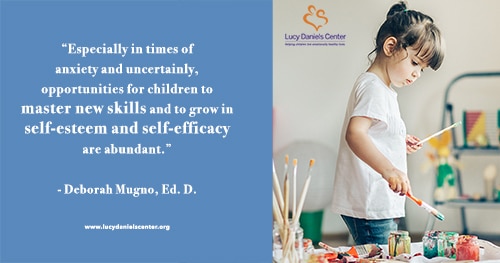Mental Health Mondays:
I Can Do It!
by Deborah Mugno, Ed. D.
Director of Education/Operations/Outreach
Lucy Daniels Center
Especially in times of anxiety and uncertainly, opportunities for children to master new skills and to grow in self-esteem and self-efficacy (a child’s belief that they are capable of managing situations and performing particular tasks) are abundant. How could that be so when it seems as though children are more clingy and seeking more reassurance to achieve a deeper sense of security?
Self-efficacy cannot be taught by simply telling children to believe in themselves or that they did a great job. Evidence shows that the key to helping children develop self-efficacy is honest feedback. This feedback provides children with guidance to understand the relationship between their effort and the subsequent results and then to persevere through challenges or setbacks. Children with high self-efficacy are likely to be more motivated and more resilient because they see themselves as problem solvers and decision makers.
The COVID-19 crisis has significantly impacted our normal routines and expectations in addition to creating obstacles and challenges that have altered family life in the most basic ways. Parents can use these times to be models of self-efficacy. When parents can share their own disappointments, failures, and frustrations yet demonstrate a willingness to work through difficulties in a reflective and honest matter, they help shape their child’s beliefs that they too can manage.
Practically, what might this look like in everyday situations? Take for example a child struggling to complete a remotely assigned math worksheet while parents work from home. Some children might constantly interrupt to ask for help with the result that both the parent and child are become frustrated, possibly angry, and fail to accomplish what each needs to get done. Over time, the following tips help children develop the beliefs and the capacities that they can indeed work through challenging situations, even if just a math worksheet.
Help your child set their own realistic short-term goals that they can verbalize or jot down. (Child: “I will try all of the problems but will circle the ones that I am not sure of. If you are busy when I am done, I think I would like to draw until you can help me.”)
Honestly praise your child’s efforts (not abilities) and problem solve together. (Parent: “I saw that you sat and worked very hard on your assignment and I also see that there are many that you are not sure of. Do you have some ideas about why you got stuck? How might your teacher help if you were in school?”)
Help your child identify their own strengths. (Parent: “You became so good at addition because you kept at it even when you were frustrated. You figured out a different way to solve those problems and it worked! Would any of those ways help with multiplication or do you need to try out some new ideas?”)
Allow your child to fail, but then help them answer the question, “What can I do better or differently next time?” It important that children recognize their success as the result of their very own strengths and capabilities. Michael Jordan, who was cut from his high school basketball team has said, “I’ve failed over and over again in my life. That is why I succeed.” Protecting children from failure can diminish their desire to try over and over again.
Self-efficacy, believing in one’s strengths to deal with challenges,seeps into every aspect of our children’s lives, and what better time than now to help them believe in the power of the phrase, “I can do this!”
Lucy Daniels Center is currently operating via telehealth services due to Covid-19. If you would like to request a consultation with a mental health clinician, please click here:https://tinyurl.com/slx79fe

